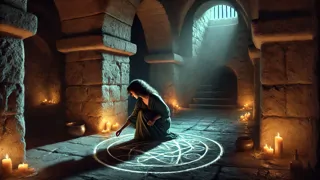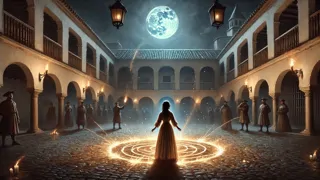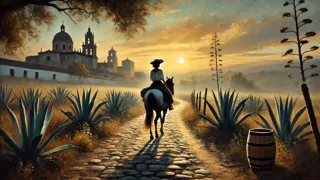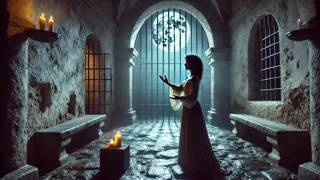Introduction
In the heart of colonial Córdoba, where whitewashed walls gleamed beneath a relentless sun and the scent of copal drifted from temple altars, the legend of La Mulata de Córdoba first unfurled its secrets. She was neither slave nor mistress but a free woman whose dark curls and luminous eyes carried an unspoken power. The marketplace buzzed with gossip of her uncanny talents—she spoke to winds as if they answered, brewed remedies that quelled fever in a night, and her laughter echoed beneath iron bars in the prison yard. When the Holy Office descended with trembling torches and whispered accusations of witchcraft, the city held its breath. Servants locked their doors, priests sharpened their tongues, and the woman they called “mulata” was dragged into a cell so forbidding that even daylight hesitated outside its barred windows. Yet within that gloom, she felt the pulse of something older than stone and oath—a hidden current of ancestral knowledge passed from mother to daughter. Under one breath she invited flames to dance on cold walls, and in the hush that followed, the world seemed to tremble. Those who claimed to guard the law whispered prayers while she sketched strange symbols in the dust. The air turned electric with possibility. That night, a pale moon climbed above Córdoba, and nothing would ever be the same once it cast its silver light upon her bound wrists and resolute gaze.
Accused of Witchcraft
The morning sun revealed iron rings and damp stone floors to the woman known only by her color and her fearlessness. Using whispers and half-hidden glances, she tracked every footstep that passed her cell. Guards crunched stones beneath heavy boots, voices low with mockery as they debated her fate. Some claimed she’d turned water into wine for late-night revelers; others swore she’d sown discord in cathedral pews. Each accusation added weight to her wrists, but it also fanned a spark in her chest. In the cell’s corners, rats skittered like silent witnesses, while the stone walls absorbed every breath she took. No window faced east; no breeze followed afternoon shadows. Her hands trembled only when she recalled her mother’s lullaby, a melody older than the church bells.

Locked away from all kindness, she taught herself to see beyond bars. She closed her eyes and conjured the murmur of the river just outside the city walls, remembered the way its surface trembled in dawn light. That memory became a bridge from her wood plank to a distant world. She whispered chants under her breath—syllables given in secret, never uttered when eyes watched. With each muted invocation, the moust of her prison dissolved into something fluid, alive, as if stone could bend to an old enchantment. Whispers in the corridor grew curious; a guard paused, believing he heard distant flutes in the marble halls. By twilight, even the jailer admitted he smelled jasmine and heard a faint hum in the walls.
Word of her midnight incantations sailed through Córdoba like a phantom breeze. Inquisitors tightened their cloaks but could not snuff the story that spread among servants and merchants. They demanded contradictions and confessions in cold interrogations. She endured hours under dripping roofs, her spirit unbroken. Late at night, she carved a circle in chalk on the cell floor, tracing lines that pulsed under candlelight. Within that circle, she glimpsed a doorway: moonlight pierced the bars, blazed on her pale skin, and she felt the threshold tremble beneath her soles. The people who called themselves her judges sensed a change too late—the pull of ancient rites that no cruel oath could bind.
Night of Fire and Shadow
When the moon reached its zenith, the jailyard fell into uncanny stillness. Lanterns swung like nervous hearts in wooden holders, thrown by a wind only she could summon. She stood within the circle of chalk, her breath rising in soft clouds, and let the power course through her. Shadows peeled from mortar joints and coalesced at her feet, forming shapes that might have been animals or phantoms of memory. Each took a glint of her intention—freedom—and shivered at her will. A low hum echoed from the outer gates, sounding both triumphant and mournful.

A single twist of her fingers sent sparks dancing along the wall. They caught on iron and stone, not to burn, but to writhe like living glyphs. The air thickened with fragrant smoke—myrrh mixed with charred cedar—as if the cell itself exhaled ancient incense. Guards who watched from the corridor recoiled, hands clamped over their mouths. One dropped his lantern; its glass shattered in a starburst of molten light. Another fell to his knees, murmuring half-formed prayers. She spoke a final word, her voice steady and low, releasing the proper command. The circle flared in moonlight and then blinked out, leaving the chalk lines etched with silver dust.
An unseen door swung open in the northern wall—no lever, no hinges, only a silent invitation. She stepped beyond the circle, clutching the hem of her cotton skirt, and felt the world shift beneath her boots. Corridors once guarded by iron doors now lay open, corridors she remembered from childhood visits to convents and chapels. The scent of night blossoms guided her, and ghostly silhouettes drifted around candlesticks, bowing in silent salute. In each gilded hall the wind carried her forward, until she reached the courtyard and all cords of fear fell away.
Outside, furling mist rolled in like startled waves. The city’s white tile rooftops shimmered under gentle starlight. She paused at the threshold, heart steady, as the night unravelled its final secret. Behind her, the cell shrank into memory. Ahead, a single path led through sleeping alleyways, past closed shops, and on toward a freedom written in the moon’s pale script.
The Flight Beyond the Walls
She emerged between ancient columns in the central plaza, where statues of saints watched in silent marble dignity. Her bare feet kissed cold cobblestones, and the breeze brought the mingled scents of night-blooming jasmine and distant sea salt. Every star seemed fixed on her course as she slipped through narrow streets painted in ochre and indigo. Behind latticed windows, shuttered shops, and alcoves of priests, the city slept, unaware that its greatest legend now trod its dreaming shadows.

On the outskirts, a lone horse waited beneath a fig tree as if summoned by her desire. Silken reins coiled around its neck like ribbons of dusk. She mounted without ceremony, her cotton dress brushing against the animal’s flank, and felt its muscles coil beneath her weight. The beast shot forward in a soft trot, hooves tapping on ancient stones long polished by pilgrims and mule carts. Lanterns appeared in her wake, these gifts of frightened townsfolk too superstitious to turn away from the miracle unraveling before them.
Dawn’s first light clashed with a final incantation on her lips. She glanced back once, toward the towers of the cathedral whose bells had tolled her condemnation. In that instant, she was either a legend or a fugitive—both an accusation and its antidote. She let the final chord of her power ring out, and the horizon bloomed in gold. By the time the town awoke, she had vanished beyond fields of agave and whispering palms, leaving behind only the faintest trace of jasmine and a single silver thread caught on a church gate.
Centuries later, shoppers in the marketplace still pause at that gate, eyes lifted to find no mark but for a solitary silver thread tangled among wood carvings. Grandmothers recall her name in low tones, and priests whisper her story between sermons. In every echoing courtyard, in every moonlit cell, there remains the pulse of her promise: injustice can burn away like mist at daybreak if one speaks the true name of freedom.
Conclusion
Long after church bells ceased their tolls for her, La Mulata de Córdoba endures as a symbol of resistance and secret grace. Her story drapes over colonial stones like trailing jasmine, reminding each generation that even the harshest sentence may conceal a path to liberation. In whispered prayers and lantern-lit vigils, her name surfaces whenever injustice treads too heavily on trembling souls. Whether you believe in her magic or merely sense the power of her resilience, her flight through stone corridors and across moonlit rooftops offers a timeless lesson: when fear binds the body, courage—and a touch of wonder—can break every barrier. Beneath the same silver moon that once guided her unseen steps, new legends rise. And every time a heart aches for justice, La Mulata’s whisper drifts on the breeze, a promise and an incantation rolled into one—invoking the strength to stand, the will to question, and the hope to walk free.


















